Main navigation
Search Results
-
-
Press release - 26/09/2023 Local Food Systems: How sustainable are the business models for local food chains?
Mobile units for processing fruit and vegetables on-site may play an important role in food supply in 2035. The EU’s FOX project investigated the form that such local food chains might take. To this end, Fraunhofer ISI developed future scenarios that could be used to test the viability of business models for regional food processing and distribution.
https://www.biooekonomie-bw.de/en/articles/pm/local-food-systems-how-sustainable-are-business-models-local-food-chains -
Press release - 09/10/2023 Microalgae: Environmentally friendly and healthy alternative to fish
Researchers at the University of Hohenheim are working on an alternative to fish consisting of microalgae. Advantage: Microalgae have high quality ingredients and also contribute to carbon storage.
https://www.biooekonomie-bw.de/en/articles/microalgae-environmentally-friendly-and-healthy-alternative-fish -
Press release - 25/09/2023 Autonomous outdoor navigation for machines used in farming, livestock and forestry
Autonomous and robust navigation is an essential capability for agricultural robots or machines that are to reach a new level of autonomy to manoeuver safely and reliably in their environment. Fraunhofer IPA will showcase what is currently technologically and economically feasible with live demos at agritechnica, the agricultural trade fair taking place in Hanover from November 12 to 18, 2023.
https://www.biooekonomie-bw.de/en/articles/pm/autonomous-outdoor-navigation-machines-used-farming-livestock-and-forestry -
Press release - 11/10/2023 Land Use: Producing More Food and Storing More Carbon
Doubling food production, saving water, and increasing carbon storage capacity – this may sound paradoxical, but would be theoretically feasible. Reaching this goal, however, would require a radical spatial reorganization of land use. This is the conclusion of researchers from Karlsruhe Institute of Technology (KIT) and the Heidelberg Institute for Geoinformation Technology (HeiGIT) of Heidelberg University.
https://www.biooekonomie-bw.de/en/articles/pm/landnutzung-mehr-nahrung-produzieren-und-gleichzeitig-mehr-kohlenstoff-speichern -
Press release - 29/09/2023 Ecological alignment of Artificial Intelligence
The European Parliament’s amendments to the proposal for a Regulation on Artificial Intelligence (AI) may be defined as a socio-ecological turnaround compared to the European Commission’s existing draft. The parliamentary draft proposes a series of environmental and climate-related provisions which, in the Oeko-Institut’s view, are feasible and technically achievable. The Oeko-Institut has reviewed these proposals in a Policy Paper.
https://www.biooekonomie-bw.de/en/articles/pm/ecological-alignment-artificial-intelligence -
Press release - 14/09/2023 The Cultivated B Initiated Pre-Submission Process towards EFSA Certification for Cultivated Sausage
The Cultivated B (TCB) began discussions with the European Food Safety Authority (EFSA) and officially entered the pre-submission process for novel food approval of a novel or non-farmed sausage product. Subsequent to the official submission, TCB will emerge as world’s first biotech company to apply for EFSA certification for cultivated meat. This is a pivotal first step in the evolution of the cultivated meat market.
https://www.biooekonomie-bw.de/en/articles/pm/cultivated-b-initiated-pre-submission-process-towards-efsa-certification-cultivated-sausage -
Press release - 27/10/2023 Lignin coating makes Geotextiles made from environmentally friendly natural fibers durable
Textiles are a given in civil engineering. Until now, textiles made of resistant synthetic fibers have been used for this purpose, having a long lifetime. For some applications, however, it would not only be sufficient but even desirable for the auxiliary textile to degrade when it has done its job. Natural fibers, in contrast, often decompose too quickly. The DITF are developing a bio-based protective coating that extends their service life.
https://www.biooekonomie-bw.de/en/articles/pm/lignin-coating-makes-geotextiles-made-environmentally-friendly-natural-fibers-durable -
Recent research shows effectiveness of biosurfactants - 28/11/2023 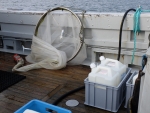
Combating oil spills - biosurfactants can stimulate microbial oil degradation
Oil spills from drilling platforms and tankers cause environmental pollution and a loss of biodiversity. Researchers at the University of Stuttgart, among others, are now using biosurfactants to improve the management of oil spills: their latest research shows that biosurfactants lead to better microbiological degradation of oil components in seawater compared to conventional dispersants.
https://www.biooekonomie-bw.de/en/articles/news/combating-oil-spills-biosurfactants-can-stimulate-microbial-oil-degradation -
-
ProGrün project - 30/12/2023 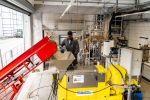
Using proteins extracted from grassland cuttings to produce animal feed and exploit by-product streams
Animal feed often contains protein from soy and importing it causes major environmental harm. In the ProGrün project, researchers at the University of Hohenheim, including a work group led by Prof. Dr. Andrea Kruse, are developing a scalable technological process to extract proteins from grassland cuttings and use them to make sustainable animal feed produced in the region where it will be used.
https://www.biooekonomie-bw.de/en/articles/news/using-proteins-extracted-grassland-cuttings-produce-animal-feed-and-exploit-product-streams -
Press release - 13/01/2022 Turning harmful CO2 into useful chemicals
Making important raw materials for fine chemicals out of carbon dioxide really works. As part of the Max Planck collaborative project eBioCO2n, a team of researchers from Fraunhofer IGB have successfully performed a first ever fixation of CO2 via a multi-enzyme enzyme reaction driven by electricity yielding a prospective intermediate for the chemical industry. The process for electro-biocatalytic CO2 fixation was recently published and is…
https://www.biooekonomie-bw.de/en/articles/pm/turning-harmful-co2-useful-chemicals -
Press release - 22/11/2021 Wound Lightness - Towards a novel material culture
The Cluster of Excellence IntCDC of the University of Stuttgart presents the "Maison Fibre" at the International Architecture Exhibition Venice. The full-scale inhabitable installation is made from robotically produced, fibrous building elements.
https://www.biooekonomie-bw.de/en/articles/pm/gewickelte-leichtigkeit-neue-materialkultur-der-architektur -
Press release - 09/02/2022 Connecting fibres: The cellulose fibre industry impresses with innovation and vision
The annual highlight of the industry is the International Conference on Cellulose Fibres in Cologne (www.cellulose-fibres.eu), where the latest innovations were showcased last week: new cellulose fibre technologies for various feedstocks and a wide range of hygiene and textile products as well as alternatives to plastics and carbon fibre for lightweight constructions.
https://www.biooekonomie-bw.de/en/articles/pm/connecting-fibres-cellulose-fibre-industry-impresses-innovation-and-vision -
Press release - 02/03/2022 Pilot project RoKKa uses wastewater to produce fertiliser and raw materials
The Ministry for the Environment, Climate Protection and the Energy Sector is funding the new research project RoKKa which is used to prove the viability of recovering raw materials from wastewater. This adds a crucial function to the scope of a conventional sewage treatment plant. Together with the operators of the sewage treatment plants in Erbach and Neu-Ulm, the project partners demonstrate the positive contribution towards climate protection…
https://www.biooekonomie-bw.de/en/articles/pm/die-klaeranlage-der-zukunft-heisst-bioraffinerie -
pre-start-up company Wheyfinery - 13/04/2022 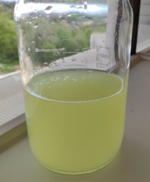
Acid whey as a valuable raw material for platform chemicals and more
There is not much you can do with acid whey, which is why several million litres of it are disposed of every year. This is both costly and not sustainable. However, researchers at Tübingen University have shown: acid whey can be used to produce precursors for biofuels, fine chemicals and antimicrobial livestock feed additives. They have set up the pre-start-up company Wheyfinery in an endeavour to make their scalable biorefinery concept…
https://www.biooekonomie-bw.de/en/articles/news/acid-whey-valuable-raw-material-platform-chemicals-and-more -
Lentil cultivation in a producers’ association - EIP-AGRI Rhizo-Linse project - 23/05/2022 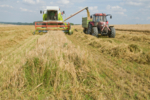
From cultivation to market – lentils from the Swabian Alb
Complicated cultivation, fluctuating yields and complex cleaning: Leisa – as lentils are called in Swabian – are demanding. So to produce lentils economically, 130 farmers in the Swabian Alb have joined forces and set up the organic producers’ association Alb-Leisa. Their lentil harvests are processed and marketed by a company called Lauteracher Alb-Feld-Früchte.
https://www.biooekonomie-bw.de/en/articles/news/cultivation-market-lentils-swabian-alb -
Lentil cleaning - EIP-AGRI Rhizo-Linse project - 26/04/2022 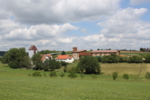
Lentil cleaning in the Altdorf mill
The Altdorf mill, just under 7 km south of the city of Böblingen, has operated lentil cleaning facilities since 2019, the year that the Sessler mill in Renningen, 20 km further north, ceased all operations including lentil cleaning. After receiving a number of enquiries from farmers and local mills, brothers Karl and Jörg Ruthardt took a chance and launched a lentil cleaning operation in addition to their mill and farm shop business.
https://www.biooekonomie-bw.de/en/articles/news/lentil-cleaning-altdorf-mill -
Press release - 02/02/2022 Animal Friends made of renewable resources
fischertechnik has set a new milestone with the Animal Friends construction kit, as the building blocks and packaging are largely made of renewable resources and the models depict playful animals in new colours. The company is thereby taking another major step towards sustainability. The bio-based building set recently won the Toy Award, one of the most prestigious awards in the industry.
https://www.biooekonomie-bw.de/en/articles/pm/animal-friends-aus-nachwachsenden-rohstoffen -
Lentil cultivation and cleaning on the farm - EIP-AGRI Rhizo-Linse project - 16/03/2022 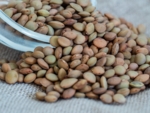
Lentils return to the Heckengäu region
Lentils are among the oldest crop plants in Central European agriculture and were once a popular food in ancient Egypt, Persia and Mesopotamia. The legume was widespread in Germany until the mid-20th century, but has since disappeared completely from farmers’ fields. Over the past decade, lentils have reappeared as a crop grown locally and are cultivated in harmony with nature.
https://www.biooekonomie-bw.de/en/articles/news/lentils-return-heckengaeu-region -
Filament winding technology for sustainable construction - 06/04/2022 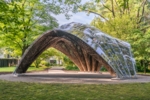
Robotic building with natural fibres
One of the greatest challenges in the construction industry is the transition to more environmentally friendly and resource-saving buildings. Researchers at the University of Stuttgart are combining state-of-the-art robotic filament winding technologies with ancient local crops to produce stable and sustainable lightweight structures from flax fibres.
https://www.biooekonomie-bw.de/en/articles/news/robotic-building-natural-fibres -
Project BW2Pro - 29/08/2022 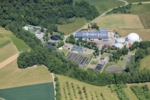
Biowaste to Products: biorefinery transforms biowaste into new products
In 2020, Germany’s population collected over 5 million tonnes of biowaste. Most of this was composted, and some was fermented into biogas. Scientists in Baden-Württemberg think there's room for more. Within the project ‘Biowaste to Products’ (BW2Pro) they want to transform biowaste into new products in a biorefinery. The idea is to produce biodegradable plant pots, mulch material, fertilisers, enzymes and biobased plastics in addition to…
https://www.biooekonomie-bw.de/en/articles/news/biowaste-products-biorefinery-transforms-biowaste-new-products -
Press release - 26/07/2022 Lavender cultivation on the Swabian alb: Essential oil and textiles from plant residues
In Provence, the lavender fields are in full bloom again. This blaze of color may soon also be seen in Baden-Württemberg. In a joint research project, the German Institutes of Textile and Fiber Research Denkendorf (DITF), the University of Hohenheim and the company naturamus are testing suitable lavender varieties and developing energy-efficient methods for producing essential oil from them.
https://www.biooekonomie-bw.de/en/articles/pm/lavender-cultivation-swabian-alb-essential-oil-and-textiles-plant-residues -
Sustainable nutrition - 05/09/2022 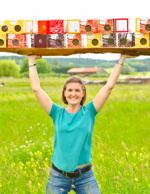
Insect pasta: eating healthily and improving the world at the same time
Insects on the dinner plate? Some people instantly dismiss the idea. Wrongly so, because in terms of animal welfare, ecological footprint and healthy nutrition, insect foods are much better than all other animal foods and are produced in a more controlled way. The fact that they can also taste really good is proven by the start-up Beneto Foods from Albstadt, which has developed protein-rich pasta in various flavours using cricket flour.
https://www.biooekonomie-bw.de/en/articles/news/insect-pasta-eating-healthily-and-improving-world-same-time -
Dossier - 19/10/2022 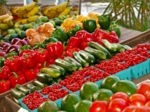
More food sustainability: crucial for people and for the environment
Strawberries in winter and imported apples? You can find them in most supermarkets. This is not sustainable. Looking to the future, the way we eat needs to change in many mundane ways – and this needs to happen quickly so that future generations will also be able to enjoy a planet that is worth living on. In Baden-Württemberg, alternative nutrition concepts are being worked at pace. Many creative ideas and innovative products already exist.
https://www.biooekonomie-bw.de/en/articles/dossiers/more-food-sustainability-crucial-people-and-environment -
Festo’s high-tech bioreactor - 10/11/2022 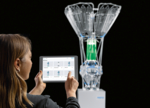
Valuable materials of all kinds - produced automatically in living cells
In future, algae could be used to produce practically everything that still requires petroleum, including plastics, fuels, medicines and food. Algae are also climate savers par excellence, because they bind ten times more CO2 than terrestrial plants. Festo, a company based in Esslingen, Germany, has developed a high-tech bioreactor that can be used to automatically cultivate the small green biofactories - and that do so a hundred times more…
https://www.biooekonomie-bw.de/en/articles/news/valuable-materials-all-kinds-produced-automatically-living-cells -
Büsnau biorefinery - 05/10/2022 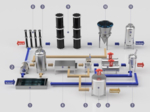
KoalAplan: municipal wastewater as a source of recyclable materials
Our wastewater not only contains dirt and excretions, but is also rich in carbon, nitrogen and phosphorus, which can be recovered. A sewage plant can thus become a source of raw materials. In the KoalAplan project, a new type of biorefinery will be used to convert the carbon recovered from wastewater into sustainable products.
https://www.biooekonomie-bw.de/en/articles/news/koalaplan-municipal-wastewater-source-recyclable-materials -
Carbon sequestration - 28/07/2022 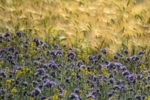
Carbon farming - climate protection on agricultural land?
Agriculture plays a key role in helping to achieve European climate targets. Central to this goal are measures that are collectively referred to as carbon farming and are often used for offsetting greenhouse gas emissions. Two Baden-Württemberg companies - CarboCert and Carbonfuture - are active in addressing the challenges and potentials of carbon farming.
https://www.biooekonomie-bw.de/en/articles/dossiers/carbon-farming-climate-protection-agricultural-land -
Press release - 12/09/2022 Bioeconomy between food and energy crisis - Opinion of the Bioeconomy Council
In its statement of September 2, 2022, the Bioeconomy Council of the German government condemns the Russian war of aggression on Ukraine and points out ways in which the resulting food and energy crisis can be alleviated with the help of the bioeconomy.
https://www.biooekonomie-bw.de/en/articles/pm/biooekonomie-zwischen-ernaehrungs-und-energiekrise-stellungnahme-des-biooekonomierats -
Press release - 29/11/2022 Proteins from Pastures: Success for initial feed trials
A tasty dish for chickens: Researchers from the University of Hohenheim in Stuttgart were able to feed the animals the first 50 kilos of protein extract that were obtained from pasture. Yet the plants found in fields and meadows offer much more than a new source of protein for pigs and poultry: They could also constitute an alternative to soy for human nutrition. They also form a basis for organic-based plastics and paper, energy, and…
https://www.biooekonomie-bw.de/en/articles/pm/proteine-aus-gruenland-schnitt-erste-fuetterungsversuche-verlaufen-erfolgreich -
Press release - 16/11/2022 Joint research and development project improves herbicide treatment with high-performance sensors
Optical technologies & artificial intelligence: University of Hohenheim, Bosch, Amazonen-Werke, and BASF Digital Farming conducts research into high-performance sensors for smart herbicide treatment
https://www.biooekonomie-bw.de/en/articles/pm/joint-research-and-development-project-improves-herbicide-treatment-high-performance-sensors -
Press release - 29/11/2022 Prototype funding for two Konstanz projects
Chemical building blocks from plastic waste; Reducing the risk of falls using virtual orientation aids: Konstanz chemists Manuel Häußler and Lukas Odenwald as well as sport scientist Lorenz Assländer receive Baden-Württemberg prototype funding for their transfer projects "Waste2DCA" and "Augmented Balance".
https://www.biooekonomie-bw.de/en/articles/pm/doppelter-erfolg-der-prototypenfoerderung -
Press release - 29/11/2022 Monitoring the Bioeconomy – The BioMonitor Project
BioMonitor addresses the information gap in bioeconomy research by re-structuring existing data and modelling framework. After more than four years of great scientific collaboration, the 17 partners share their results.
https://www.biooekonomie-bw.de/en/articles/pm/monitoring-bioeconomy-biomonitor-project -
Start-up 'Innovation Matters' - 19/12/2022 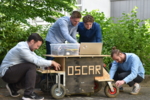
Saffron cultivation in Germany - sustainable with support from robots
Saffron is one of the most expensive spices in the world, because picking it involves a complex manual process. This treasure therefore comes to us mostly from countries such as Iran with poor working conditions and low wages. A start-up company called Innovation Matters from Baden-Württemberg is now developing a robot-assisted, automated process that will make saffron cultivation attractive in Germany as well as ecological and fair.
https://www.biooekonomie-bw.de/en/articles/news/saffron-cultivation-germany-sustainable-support-robots -
Vaccination for plants - 23/01/2023 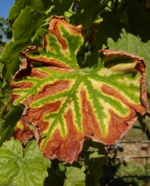
Dialogue instead of a chemical maze – new strategy for sustainable crop protection
Climate change creates stress. This provides an opportunity for pests to exploit plant weaknesses and reproduce. For the infested plant, this can be catastrophic and often fatal. But instead of continuing to protect harvest yields with toxic substances as before, the transnational DialogProTec project is now taking a completely new approach: researchers want to intervene in the communication between plants and pests to keep them healthy.
https://www.biooekonomie-bw.de/en/articles/news/dialogue-instead-chemical-maze-new-strategy-sustainable-crop-protection -
Valorization of biological materials - 12/01/2023 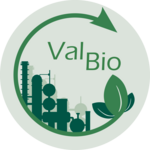
ValBio-Urban brings bioeconomy research to users
Reducing carbon dioxide emissions and the capture and utilization of CO2 are important steps towards achieving a climate-neutral and sustainable economy. Accordingly, as part of the ValBio-Urban research project, an interdisciplinary team from the University of Stuttgart is developing bioeconomic approaches to solutions that will be implemented with companies from Baden-Württemberg.
https://www.biooekonomie-bw.de/en/articles/news/valbio-urban-brings-bioeconomy-research-users -
Press release - 30/11/2022 New Business Directory: Renewable Carbon Companies (ReCaCo)
Find companies that already offer fossil carbon free products, made from biomass, CO2 and recycling
https://www.biooekonomie-bw.de/en/articles/pm/new-business-directory-renewable-carbon-companies-recaco -
Event - - Cellulose Fibres Conference 2023
Cologne and online, Kongress/Symposiumhttps://www.biooekonomie-bw.de/en/events/cellulose-fibres-conference-2023 -
Press release - 09/12/2022 Digital Summit: Chancellor Scholz chooses Phoenix agricultural robot as his favorite
AI & robotics from the University of Hohenheim advance environmental protection & sustainability in agriculture / German Chancellor Scholz impressed by potential of Swabian multi-talent robot
https://www.biooekonomie-bw.de/en/articles/pm/digital-gipfel-kanzler-scholz-waehlt-agrar-roboter-phoenix-zu-seinem-favoriten -
Press release - 20/12/2022 Strong and biodegradable
A polyester plastic of great mechanical stability, which is also easily recyclable and even compostable: Stefan Mecking, chemist at the University of Konstanz, and his research group present a new material.
https://www.biooekonomie-bw.de/en/articles/pm/strong-and-biodegradable -
Synergistic effects with microalgae and purple bacteria - 03/02/2023 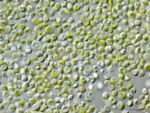
Working towards a hydrogen economy with a wastewater biorefinery: the SmartBioH2-BW project
A biorefinery that uses industrial wastewater and residual material streams is being built in Rheinfelden (Baden). It will have two interlinking bioreactors and will synthesize biohydrogen as well as organic basic materials such as carotenoids and proteins. SmartBioH2-BW is a pilot project run by the Urban and Industrial Biorefineries initiative and funded by the Baden-Württemberg Ministry of the Environment, Climate Protection and Energy Sector.
https://www.biooekonomie-bw.de/en/articles/news/working-towards-hydrogen-economy-wastewater-biorefinery-smartbioh2-bw-project -
Press release - 08/12/2022 Leibniz-Prize for Prof. Achim Menges
The German Research Foundation (DFG) has awarded the 2023 Gottfried Wilhelm Leibniz Prize to Prof. Achim Menges, head of the Institute for Computational Design and Construction at the University of Stuttgart. The award, which is endowed with EUR 2.5 million, is considered by many the most important research prize in Germany.
https://www.biooekonomie-bw.de/en/articles/pm/leibniz-preis-fuer-prof-achim-menges -
Press release - 30/11/2022 Proposed new packaging rules acknowledge environmental and climate benefits of compostable plastic packaging
European Bioplastics (EUBP) begrüßt die von der Europäischen Kommission verabschiedeten Entwürfe für neue Verpackungs- und Biokunststoffvorschriften. „Wir begrüßen das erste umfassende politische Rahmenwerk der Kommission für innovative Biokunststoffe, das deren Potenzial für einen positiven Beitrag zur Umwelt anerkennt.
https://www.biooekonomie-bw.de/en/articles/pm/proposed-new-packaging-rules-acknowledge-environmental-and-climate-benefits-compostable-plastic-packaging -
Press release - 15/12/2022 Taking responsibility to protect biodiversity
The launch of the global Nature Positive Universities initiative was announced at the UN Biodiversity Conference (COP 15), held in Montreal, Canada, in December 2022. The University of Konstanz is one of more than one hundred universities from all five continents joining the initiative. The common goal is to address the university's own impact on nature and to identify and implement effective measures to halt and reverse the loss of…
https://www.biooekonomie-bw.de/en/articles/pm/verantwortung-uebernehmen-zum-schutz-der-biodiversitaet -
Press release - 08/12/2022 Tübingen Environmental Researcher Lars Angenent Receives the Leibniz Prize
Tübingen biotechnologist Lars Angenent is being awarded the Leibniz Prize by the German Research Foundation (DFG) in appreciation of his outstanding work in the field of environmental biotechnology, it was announced in Bonn on Thursday. The DFG said: “In view of climate change and the resulting need to develop a sustainable food, chemistry and energy economy, his work is highly relevant.”
https://www.biooekonomie-bw.de/en/articles/pm/tuebingen-environmental-researcher-lars-angenent-receives-leibniz-prize -
Think Tank FYI: Agriculture 5.0 - 16/02/2023 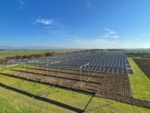
Agriculture 5.0: fighting the climate crisis with agrophotovoltaics and biochar
Climate protection, agriculture and biodiversity are closely intertwined. Agriculture 5.0 provides positive guidance, as the Offenburg University of Applied Sciences has demonstrated: agrophotovoltaics (or agrivoltaics), which is currently in vogue in Germany, can be used to generate solar power on high-yield fields. Biomass strips and biochar remove CO2 from the atmosphere. All this improves soil quality and promotes biodiversity.
https://www.biooekonomie-bw.de/en/articles/news/agriculture-50-fighting-climate-crisis-agrophotovoltaics-and-biochar -
Press release - 29/11/2022 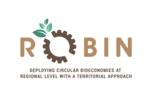
Five European pilot regions are joining forces for the bioeconomy
BIOPRO Baden-Württemberg participates in the Horizon Europe ROBIN project to improve the participation of regional bioeconomy strategies and related policies across Europe.
https://www.biooekonomie-bw.de/en/articles/pm/fuenf-europaeische-pilotregionen-schliessen-sich-fuer-die-biooekonomie-zusammen -
Press release - 08/03/2023 Green gold: Torrefied biomass to replace coal and oil
In February, the Estonian-based startup New Standard Oil successfully commissioned their first industrial-scale prototype for drying and torrefaction of biogenic feedstock operating with superheated steam at atmospheric pressure.
https://www.biooekonomie-bw.de/en/articles/pm/green-gold-torrefied-biomass-replace-coal-and-oil -
Press release - 10/03/2023 Carbon fibres from lignin - a new process for economical production
A novel, both environmentally friendly and cost-saving process for the production of carbon fibers from lignin has been developed at DITF. It is characterized by high energy-saving potential. The avoidance of solvents and the use of natural raw materials make the process environmentally friendly.
https://www.biooekonomie-bw.de/en/articles/pm/carbon-fibres-lignin-new-process-economical-production -
Press release - 01/03/2023 Mulching time of forest meadows influences insect diversity
Researchers at the University of Freiburg have examined how mulching at different times affects insect flower-visitors and larvae.
https://www.biooekonomie-bw.de/en/articles/pm/der-mulchzeitpunkt-von-waldwiesen-beeinflusst-die-insektenvielfalt